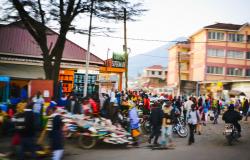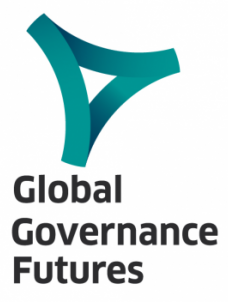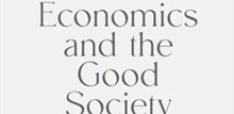Beyond ‘Stay Safe’: COVID-19 and Inequality in South Africa - A Conversation with GGF 2035 Fellow Tessa Dooms

This interview was conducted by the Global Governance Futures – Robert Bosch Foundation Multilateral Dialogues, which brings together young professionals to look ahead 10 years and recommend ways to address global challenges.
You have worked with a diverse range of stakeholders in Africa: What are some of the ways that you see the private and public sector working together to address the coronavirus pandemic in Africa?
The private sector, particularly big corporations, need to understand that health and poverty reduction are for the public good. People should not be forced to make a choice between jeopardizing their health for work or starvation. As the coronavirus has shown us, inequality increases the virus’ spread and worsens our ability to respond to the pandemic effectively. The definition of the private sector should also be intentionally expanded to include small and micro-enterprises. A true understanding of the roles that informal sectors play in economic development will go a long way toward a national response that uplifts everyone.
To improve the response to COVID-19, the public sector needs to strengthen public trust. It is only through trust that governments can create financial partnerships with the private sector. As champions of the public good, the public sector can foster humanitarian and economic protections with the private sector for effective post-pandemic recovery. In addition to the unemployment insurance support that the government is administering – albeit ineffectively – other economic protections may include small and micro business support, entry-level social sector jobs for youth, and more public employment programs for short-term work opportunities.
 COVID-19 has exacerbated many systemic inequalities, from women suffering from domestic abuse, joblessness to systemic racism. What policies should a government adapt if it wants to fight not only the coronavirus, but also those inequalities?
COVID-19 has exacerbated many systemic inequalities, from women suffering from domestic abuse, joblessness to systemic racism. What policies should a government adapt if it wants to fight not only the coronavirus, but also those inequalities?
The COVID-19 crisis has exacerbated health disparities, inequities in housing access, and economic exclusion in South Africa. The virus and the lockdown have made social distancing impossible for the urban poor and created food shortages overnight. To recover from the pandemic will require an intentional and collaborative approach by the public and private sectors. The need for social and economic solidarity is clear, but the path toward unity seems murky.
The South African government responded to gender-based violence during the lockdowns with hotlines and increased access to women's shelters. However, the government fell short in responding to health hazards and mass hunger in shack dwellings during the pandemic. The government should prioritize response plans for outbreaks in informal settlements and build communities that are resilient to future disruptions.
South Africa is a country with many inequalities. Because of this, a differentiated approach should be applied to people in different geographic and socioeconomic circumstances. The lockdown rules that would suit middle-class suburbia cannot be implemented in densely-populated informal settlements. The state, now more than ever, needs to make practical implementations that govern the two sides of South Africa.
How do you think the age structure in Africa, with about one-fifth (19 percent) of the population in the 15-24 age bracket, will affect the responses to and impact of COVID-19?
Youth unemployment in Africa has been as high as 58% before the pandemic, and will undoubtedly rise as the crisis continues. As such, economic participation of the youth is imperative. New industries are emerging and with limited mobility during the pandemic, the need for localized solutions presents an opportunity to bring young people into the mainstream of policy and practice. From finding innovative local solutions to minimizing social burdens, young people have both the ability and the will to be active drivers of change in the face of COVID-19.
Why did the South African government ban alcohol and cigarettes during the coronavirus lockdown? Do you think it made any difference on the overall number of infections or the death toll in South Africa?
Some of the failures in the South African government’s response to COVID-19 have been its inability to clearly communicate its decision-making and its choice to opt for restrictions in the form of lockdown regulations over mechanisms to educate and encourage behavioral change to foster the necessary health behaviors. Outside of a very generic message to “stay safe”, even calls to do basic health behavior such as hand washing, wearing a mask and social distancing have landed more as instructions than a genuine effort to educate people on the danger presented by COVID-19 and the reasons for the health behaviour required. This approach is reflected in the banning of alcohol and tobacco that has seen the government use its power to restrict access rather than to engage people on the health and health system risks consumption of these substances pose.
South Africa has long been a country with high and unhealthy alcohol consumption patterns. Binge drinking is a common part of our social milieu, with a history of alcohol as part of systems of oppression. Farms and other low-income workers have been and are still paid in alcohol rather than with money. This has led to a healthcare system that is burdened by cases of alcohol-related trauma. From drunk driving to violence, alcohol has a decidedly negative impact on healthcare. To this end, the ban on alcohol at a time of restrictions meant safer living environments and a huge reduction in hospitalizations related to alcohol consumption, giving much-needed space to COVID-19 patients.
The cigarette ban has a less clear rationale. Concerns for the health consequences of tobacco during a respiratory disease outbreak was the official reason provided. However, a short-term ban will not address the existing impacts of chronic smoking on the population. While the need for alcohol restrictions to prevent an overburdened healthcare system has been clear, the need for restrictions of tobacco sales remains murky. Recently, alcohol sales have been allowed to resume, but tobacco remains banned.
Though with good intentions, both bans appear to be a lazy attempt at governance. If the problems related to alcohol and tobacco consumption are long-standing, surely the response needs to be targeted at behavioral change that has longevity rather than unsustainable restrictions.
The same goes for gender-based violence responses such as police sensitivity training, harsher punishments for offenders, and shelters for victims that are necessary but largely reactive. The state does not seem to understand its role in using policy and socialization mechanisms to drive social change. If we do not place incentives for pathways for development, we will always need punitive measures that yield short-term success rather than societal changes that will follow us into the future.
The Black Lives Matter (BLM) protests have recently hit parts of Africa. How are people in Africa drawing parallels to the BLM movement happening in the US now? How do you think this is affecting US-African relations?
Ironically, African governments who routinely use state forces to brutalize Black bodies in Africa have chastised the US for its inability to reform itself. African governments have been unreflective of their own culpability in systemic racism. Poor Black South Africans live in fear of the police and the military during lockdowns. They are reluctant to take to the streets in support of the global BLM movements, as they fear they will face their own brutalization.
Countless incidents of the state using force on Black South Africans predated COVID-19. During lockdowns, 11 Black South Africans have lost their lives at the hands of security forces without any accountability by the state, while many others have been injured.
For Africans, solidarity with Black lives in the African diaspora must include their own lives mattering to their governments in Africa. Until then, diplomacy and activism from African heads of states will ring hollow.
Tessa Dooms is the director of Jasoro Consulting and a fellow of the Global Governance Futures – Robert Bosch Foundation Multilateral Dialogues program.
Photo by Blue Ox Studio from Pexels


